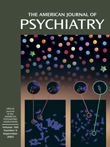A Placebo-Controlled, Double-Blind Study of the Efficacy and Safety of Aripiprazole in Patients With Acute Bipolar Mania
Abstract
OBJECTIVE: The authors compared the efficacy and safety of aripiprazole, a novel antipsychotic, to placebo for treatment of patients in an acute manic or mixed episode of bipolar disorder. METHOD: This 3-week, multicenter, double-blind study randomly assigned 262 bipolar disorder patients in an acute manic or mixed episode to aripiprazole, 30 mg/day (reduced to 15 mg/day if needed for tolerability), or placebo. Patients remained hospitalized for at least 2 of the weeks. The primary efficacy measure was mean change from baseline in total score on the Young Mania Rating Scale; response was defined as a decrease in score of ≥50%. RESULTS: Aripiprazole produced statistically significant mean improvements in total score on the Young Mania Rating Scale compared with placebo (–8.2 versus –3.4, respectively) and produced a significantly higher response rate (40% versus 19%). For key efficacy variables (response per Young Mania Rating Scale; Clinical Global Impression—Bipolar Version scores for severity of illness [mania] and change from preceding phase [mania]), aripiprazole separated from placebo by day 4. The completion rate was significantly higher with aripiprazole than with placebo (42% versus 21%). Discontinuations due to adverse events did not differ significantly between the aripiprazole and placebo groups. There were no significant changes in body weight versus placebo, and aripiprazole was not associated with elevated serum prolactin or QTc prolongation. CONCLUSIONS: Aripiprazole had significantly greater efficacy than placebo for the treatment of bipolar disorder patients in acute manic or mixed episodes and was safe and well tolerated in this randomized controlled trial.



